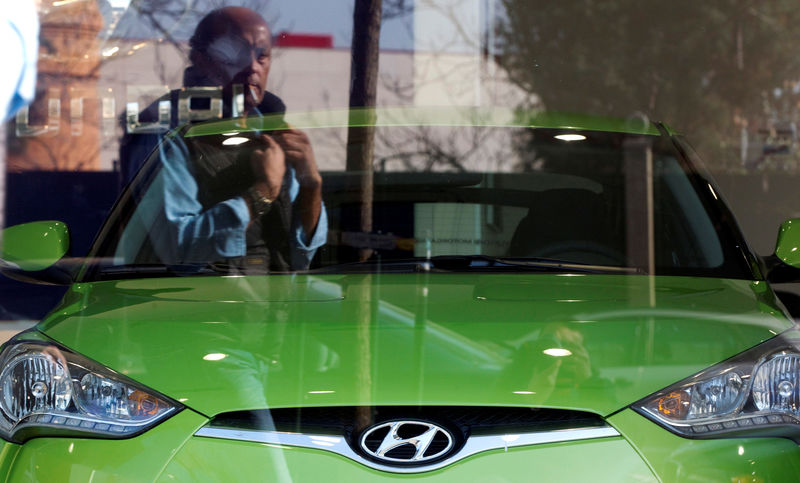By Jesús Aguado
MADRID (Reuters) - Pensioner Willy Clement complains that BBVA (MC:BBVA), his local bank in Spain, is pestering him with commercial offers for consumer loans.
An aggressive push by Spanish banks into consumer lending has raised fears of a return to the kind of lucrative but risky practices that tipped the financial system and economy into crisis a decade ago. The value of outstanding loans for purchases such as cars and holidays has jumped 47 percent in just 3-1/2 years.
"They keep sending me credit offers via e-mail, for as much as 30,000 euros ($34,020.00)," said 69-year-old Clement, who lives in Madrid. BBVA declined to comment on Clement's case.
With about 85 billion euros ($98 billion) of non-mortgage lending to Spanish households now outstanding, the central bank warned recently that many loans could sour, which would weaken banks and pose renewed risks to financial stability.
"Lenders are taking risks beyond their means, especially in consumer credit. It seems we are going back to the same old days and that nothing has changed," said Jose Carlos Diez, an economics professor at the Universidad de Alcala.
Consumer loans account for just 5 percent of total bank lending but Spanish banks are turning increasingly to this type of business, where the risk of default is relatively high and loan security low, to improve lending margins and profitability.
Mortgage lending remains the banks' biggest business at around 40 percent of total loans but has fallen 10.4 percent, to about 495 billion euros in June, since the end of 2014. Overall, average returns on lending in Spain, at 7.5 percent, fall well short of banks' cost of capital of around 10 percent.
Clients say banks are carrying out lending promotions via SMS messages, email campaigns and by post, offering pre-authorized credit of up to 30,000 euros.
" Bankia keeps calling me and my daughter on the phone, at first it is just to talk about mortgages, but then they also want to sell consumer loans," Concepción Polanco, a 65-year-old pensioner, told Reuters as she left a Bankia branch in Madrid.
Bankia (MC:BKIA) declined to comment on this specific case but said that around 2.5 million of its retail clients had access to 35 billion euros in pre-authorized loans.
It said it granted credit of up to 30,000 euros, repayable over 72 to 96 months, only after borrowers underwent individual risk assessments. The loans aimed to help clients purchase or finance consumer goods such as cars at interest rates of 9 percent or above.
"The only thing that really gives you higher yields and improves your margins right now is consumer lending. This is the business banks are after, alongside commissions and fees in the funds and insurance industry," said one banker.
A BANKING 'BANDWAGON'
The drive into consumer lending has coincided with a drop-off in mortgage lending, where average loan returns are between 2 and 2.6 percent, according to data from the Bank of Spain and the National Statistics Institute.
The government's plan to make lenders bear the cost of stamp duty on mortgages has further dampened banks' enthusiasm for the mortgage business. The move will cost them an estimated 1.15 billion euros a year, according to tax inspectors' union Gestha.
"It is almost impossible for a bank not to jump on this (consumer lending) bandwagon now. If you don't do it, your neighbor will do it," said another banker, who spoke on condition of anonymity.
At Caixabank (MC:CABK) the value of new consumer lending grew 15 percent in the first nine months of 2018, outstripping its 9 percent growth in new mortgage lending.
Its three-year strategic plan, announced last week, foresees compound growth of 5 percent in core revenue, to be driven by an accumulated 6-7 percent annual growth in consumer lending. At the same time, it expects its stock of mortgage loans to fall.
Consumers' willingness to borrow for major purchases reflects steady growth in Spain's economy since it emerged from a five-year slowdown in late 2013 -- of over 3 percent each year from 2015 to 2017. But economists have warned that the expansion may have passed its peak.
In this context, the Bank of Spain wants the government to empower it to better control and limit risks related to the fast-growing expansion in credit by quickly setting up a macroprudential authority.
Overall, the stock of Spanish consumer loans grew 5 percent between the second and first quarters of this year whereas the mortgage business remained flat.
Fernando Rojas, a consultant at the independent think-tank Analistas Financieros Internacionales, said competition for consumer lending was so acute that some banks were even offering interest rates of less than 6 percent on loans to fund holidays.
"For now, consumer loans cover the cost of capital but this could change if the economic situation worsens," Rojas said.
